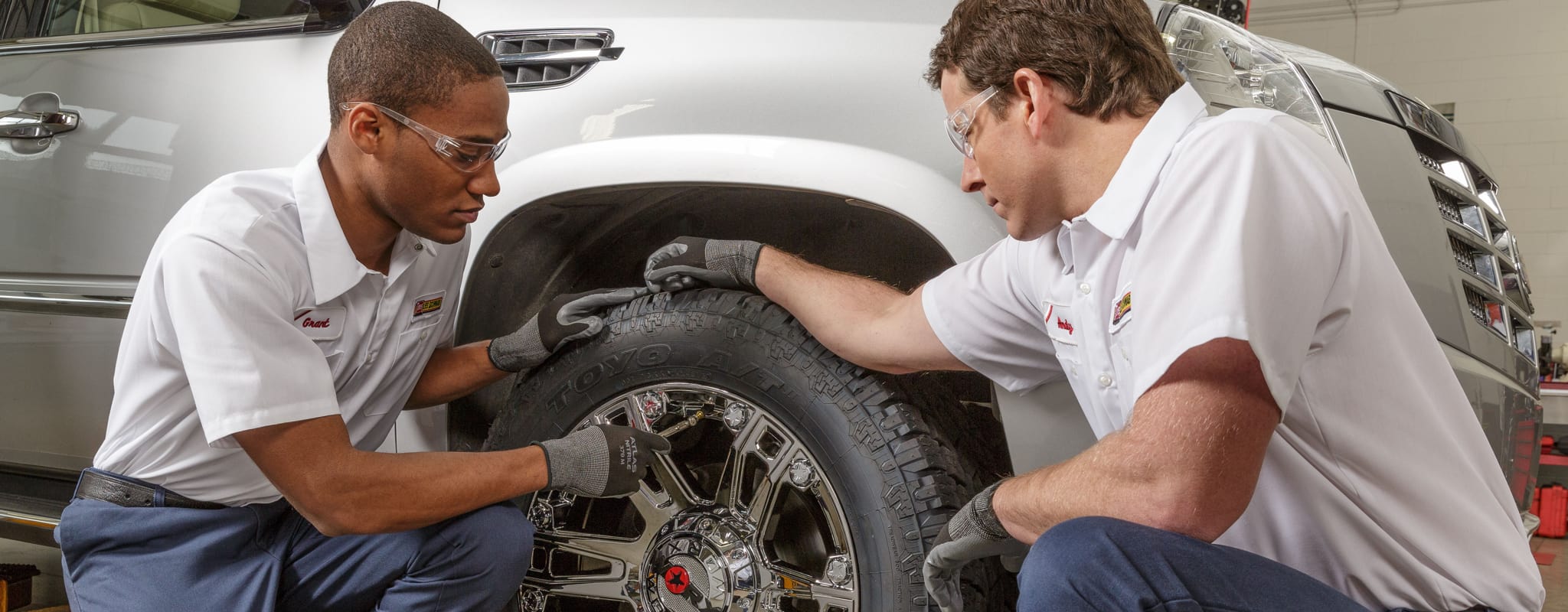Tire Service: The Impact of Weather
When it concerns making certain optimum efficiency and safety when traveling, comprehending the impact of climate condition on tire service is crucial. From scorching warmth to icy roadways, each weather element can significantly influence tire functionality and general driving experience. By delving into the effects of varying weather on tires, chauffeurs can acquire valuable understandings that may enhance their lorry's efficiency and longevity. In this conversation, we will certainly discover the complex connection between climate condition and tire solution, shedding light on the significance of weather-specific tire upkeep techniques and considerations.
Warm and Tire Performance
When revealed to high temperatures, tires experience adjustments in performance that can dramatically influence vehicle safety and handling. The heat generated from long term driving or hot weather condition problems triggers the tire rubber to soften, bring about decreased step life and raised wear. As the rubber becomes softer, the tire's hold when driving reduces, influencing stopping distances and overall traction. In extreme instances, extreme warm can even cause tire blowouts, positioning a severe safety and security danger to the lorry and its owners.

Winter Impacts
Cold weather condition problems can have a considerable influence on tire efficiency and security. As temperatures decline, tire rubber can set, bring about reduced traction on icy or snow-covered roadways. In cool weather condition, tires might likewise lose atmospheric pressure much more rapidly, which can influence dealing with and fuel performance. Furthermore, cold temperature levels can create tire sidewalls to tense, increasing the risk of damage from craters or various other roadway dangers.
To reduce the impacts of winter on tires, it is crucial to regularly examine tire stress and inflate them to the producer's recommended levels. Using winter months or all-season tires created for cold climate problems can likewise improve traction and grasp on icy or snowy roadways. Correct tire upkeep, consisting of normal examinations for wear and damages, comes to be also much more important during cooler months to guarantee ideal performance and security.
Rainy Conditions Effect
Throughout wet conditions, tire performance and safety can be significantly affected by the damp road surfaces and lowered visibility. The step pattern of tires plays a crucial role in keeping grip on damp roadways. Tires with worn-out treads are extra vulnerable to hydroplaning, where a layer of water constructs up between the tire and the roadway surface area, leading to loss of grip. To fight this, motorists should consistently evaluate their tires for appropriate walk depth and take into consideration buying tires specifically made for wet conditions.
Additionally, stormy weather can likewise reduce presence, making it testing for drivers to see the roadway in advance plainly (GMC Tire Service). In such problems, it is important to change driving rates accordingly and keep a safe adhering to distance to permit for sudden quits. Appropriately filled with air tires can also aid in keeping control on wet roads by supplying better handling and hold
Snow and Tire Safety And Security
Snow-covered roadways pose one-of-a-kind obstacles for motorists, emphasizing the value of proper tire selection and upkeep. When driving in snowy conditions, having the appropriate tires can make a considerable difference in safety and security and efficiency. Winter tires are developed with unique rubber compounds and step patterns to give much better traction on snow and ice compared to all-season tires. The much deeper treads and sipes of winter tires aid grip the road much better, lowering the risk of slipping and sliding.

In addition, drivers should take into consideration setting up tire chains in severe snowy problems. Tire chains provide additional look at this site traction by grasping the snow and ice, enhancing stability and control. It is crucial to adhere to manufacturer instructions when using and installing tire chains to avoid damages to the tires and vehicle (GMC Tire Service). By selecting the ideal tires, maintaining correct inflation, and thinking about added grip help like tire chains, chauffeurs can improve More Help their safety when navigating snow-covered roads.
Weather-Related Tire Maintenance
When faced with different climate condition, proper tire upkeep becomes a crucial element of vehicle safety and efficiency. Weather-related tire upkeep includes a variety of methods focused on making certain ideal tire feature and durability in different weather circumstances. One key aspect of weather-related tire upkeep is tire stress regulation. Changing temperatures can trigger tire pressure to vary, affecting grip and fuel performance. Consistently readjusting and checking tire pressure according to maker recommendations is necessary for risk-free driving in changing climate condition. In addition, tire walk depth plays a considerable function in dealing with various weather condition aspects. Tires with sufficient walk deepness give far better grip on damp or icy roads, minimizing the risk of skidding or hydroplaning. Checking tire tread on a regular basis and replacing tires when tread wear reaches a certain depth is essential for keeping traction and security in unfavorable weather condition. By prioritizing weather-related tire upkeep, chauffeurs can boost safety and security, enhance vehicle efficiency, and prolong the lifespan of their tires.
Conclusion
In conclusion, weather conditions have a considerable impact on tire performance and safety and security. From heat affecting tire stress and put on to chilly weather lowering traction, it is essential to consider the weather when keeping and making use of tires.
In this discussion, we will certainly explore the detailed connection between weather click for source condition problems and tire service, shedding light on the significance of weather-specific tire upkeep practices and factors to consider.
